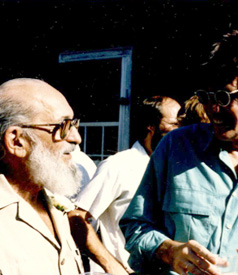Rethinking Education as the Practice of Freedom: Paulo Freire and the Promise of Critical Pedagogy
Sunday 03 January 2010
by: Henry A. Giroux, t r u t h o u t | Op-Ed
Paulo Freire and Henry A. Giroux, Amherst, Massachusetts, 1981. (Photo: Henry A. Giroux)
Paulo Freire is one of the most important critical educators of the 20th century.[1] Not only is he considered one of the founders of critical pedagogy, but he also played a crucial role in developing a highly successful literacy campaign in Brazil before the onslaught of the junta in 1964. Once the military took over the government, Freire was imprisoned for a short time for his efforts. He eventually was released and went into exile, primarily in Chile and later in Geneva, Switzerland, for a number of years. Once a semblance of democracy returned to Brazil, he went back to his country in 1980 and played a significant role in shaping its educational policies until his untimely death in 1997. His book, "Pedagogy of the Oppressed," is considered one of the classic texts of critical pedagogy, and has sold over a million copies, influencing generations of teachers and intellectuals both in the United States and abroad. Since the 1980s, there has been no intellectual on the North American educational scene who has matched either his theoretical rigor or his moral courage. Most schools and colleges of education are now dominated by conservative ideologies, hooked on methods, slavishly wedded to instrumentalized accountability measures and run by administrators who lack either a broader vision or critical understanding of education as a force for strengthening the imagination and expanding democratic public life.
READ FULL ARTICLE

by: Henry A. Giroux, t r u t h o u t | Op-Ed
Paulo Freire and Henry A. Giroux, Amherst, Massachusetts, 1981. (Photo: Henry A. Giroux)
Paulo Freire is one of the most important critical educators of the 20th century.[1] Not only is he considered one of the founders of critical pedagogy, but he also played a crucial role in developing a highly successful literacy campaign in Brazil before the onslaught of the junta in 1964. Once the military took over the government, Freire was imprisoned for a short time for his efforts. He eventually was released and went into exile, primarily in Chile and later in Geneva, Switzerland, for a number of years. Once a semblance of democracy returned to Brazil, he went back to his country in 1980 and played a significant role in shaping its educational policies until his untimely death in 1997. His book, "Pedagogy of the Oppressed," is considered one of the classic texts of critical pedagogy, and has sold over a million copies, influencing generations of teachers and intellectuals both in the United States and abroad. Since the 1980s, there has been no intellectual on the North American educational scene who has matched either his theoretical rigor or his moral courage. Most schools and colleges of education are now dominated by conservative ideologies, hooked on methods, slavishly wedded to instrumentalized accountability measures and run by administrators who lack either a broader vision or critical understanding of education as a force for strengthening the imagination and expanding democratic public life.
READ FULL ARTICLE

22:11:34 -
nursing -